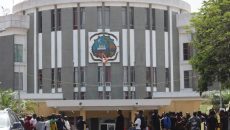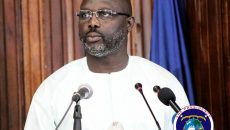Amid the growing call for the establishment of a war crimes court, the United States House of Representatives has passed a resolution to reaffirm strong U.S.-Liberia ties and call for full implementation of the Truth and Reconciliation Commission’s recommendations, including the establishment of a special war crimes tribunal.
Resolution 1055 was introduced in September by outgoing Representative, Daniel Donovan, Jr., a Republican lawmaker who represents New York’s Staten Island, which has one of the highest concentrations of Liberians in the U.S.
Donovan was defeated in the recent U.S. midterm election by Democrat Max Rose, who won 52.8 percent of the total votes.
The resolution was earlier passed in October by the House Committee on Foreign Affairs.
Prior to the votes after being introduced on the floor of the House of Representatives, the chair of the Foreign Affairs Committee, Ed Royce, expressed his support for the resolution and praised Donovan and his co-sponsors for the resolution.
“I rise in support of H. Res. 1055, which affirms the strong ties between the United States and Liberia and calls for full implementation of the Truth and Reconciliation Commission recommendations,†Royce said.
He said during his time as chair of the Africa Subcommittee, the U.S. Congress conducted hearings and passed a legislation to bring attention to the civil war in Liberia and Sierra Leone that killed 200,000 people and displaced more than 1 million, including a staff currently serving in his office who became orphaned because of the war.
“We heard a young girl – no more than 10 years old – recount the atrocities she herself endured during the war, a gruesome illustration of the horrific and lasting impact this conflict had on the people of Liberia and Sierra Leone,†he explained.
He further told members of the U.S. House of Representatives that the work of his committee reached across party lines to lead to the arrest and trial of former president Charles Taylor, who is currently serving a jail sentence for aiding and abetting war in Sierra Leone.
Royce said despite the country’s current peace and democratic gains, much more is required to crack down on corruption and create a more conducive environment for trade and economic investment. He expressed the need for the government to ensure that policies are in place to encourage businesses to invest, grow, and create jobs.
“We stand by the Liberian people in their continued efforts for a more prosperous and democratic Liberia,†he noted.
The passage of the resolution by the U.S. House of Representatives came just two days after a group of activists under the banner of the Campaigners and Victims for Justice gathered to stage a peaceful protest calling for the establishment of a war crimes court in the country.
The protesters gathered in front of the U.S. embassy, the European Union embassy, the United Nations headquarters, and paraded along principal streets in Monrovia.
Since the Truth and Reconciliation Commission released its final report in 2008, recommending prosecution for war criminals, no one has been tried for war crimes in the country.
In July, the U.N. Human Rights Committee said the government should establish a process for justice, expressing concern that “none†of the alleged perpetrators had been brought to justice.
Recently, former U.S. ambassador-at-Large for global criminal justice, Stephen Rapp, and United Nations High Commission for Human Rights’ country representative to Liberia, Uchenna Emelonye, called for the establishment of a war crimes court in the country.
Featured photo by Eric B. Walker



